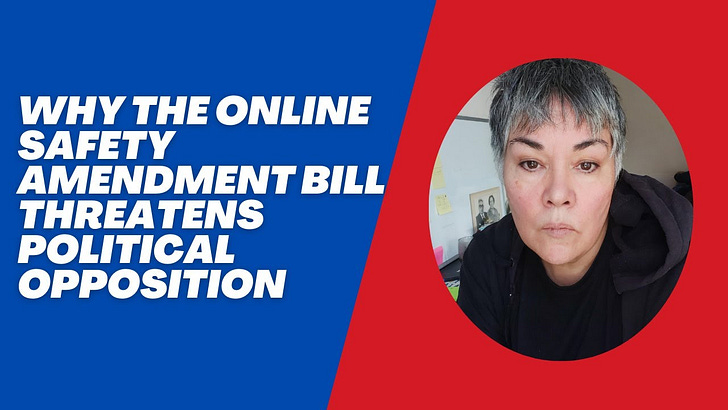Why the Online Safety Amendment Bill Threatens Political Opposition
How Australia's Trust Exchange (TEx) initiative with Google and the backdoor digital ID bill works to derail democracy in Australia.
I want to address an urgent issue that goes beyond privacy, free speech, and democracy. This is a direct message to the Opposition parties and all those who value a fair and transparent political process.
The Online Safety Amendment (Social Media Minimum Age) Bill 2024 might seem, on the surface, like a harmless effort to protect young Australians. But when you peel back the layers, it becomes clear that this bill presents unprecedented risks—not just for individual privacy, but for the survival of political opposition in our democracy.
Overview of the Bill
Let’s start with what this bill proposes: mandatory age verification for all Australians, regardless of age, to access social media platforms like Facebook, TikTok, or X (formerly Twitter). At first glance, this might seem like a step toward protecting children online.
But here’s what it really does:
It forces Australians to link their real-world identities to their online presence.
It creates a backdoor for the government to introduce Digital ID, a policy Australians have already made clear they do not want.
And, as if that weren’t concerning enough, the government is already working on a project called TEx—or Trust Exchange—which integrates Digital ID with big tech platforms like Google, social media, and even banking systems.
Risks to Opposition Parties
This is where it gets alarming, especially for political opposition. Let me explain.
Big tech already has the tools to track, profile, and manipulate users. With this bill, those tools will be weaponized. Here’s how:
Search Result Manipulation
Platforms like Google use profiling to redirect search results, amplifying messages that align with preferred narratives while suppressing alternative viewpoints. For an opposition party, this means your policy ideas, campaign messages, and even critical discussions about the government could be buried under an avalanche of state-approved messaging.
Imagine voters searching for your policies and being funnelled instead toward narratives that discredit your stance or push government propaganda. The digital playing field is no longer even; it’s completely stacked against you.
Suppression and Amplification
Next, let’s talk about suppression and amplification.
Suppression: If your supporters or candidates post content critical of government policies, platforms could suppress it. They can de-rank your posts, demonetize your videos, or shadow-ban your accounts altogether. This silences dissent and discourages engagement from your base.
Amplification: Meanwhile, the government’s messages are boosted—pushed to the top of feeds, trending lists, and search results. This creates the illusion of widespread support, drowning out alternative voices.
In short, the government can control the narrative while opposition voices are muted.
Targeted Political Manipulation
But the most chilling tool is targeted manipulation.
With the integration of TEx and Digital ID, the government—and by extension, big tech—will know precisely who you are, what you believe, and how you’re likely to react. AI systems already predict our behaviours with alarming accuracy. Now, imagine that power in the hands of a government seeking to discredit or marginalize its political opponents.
Opposition voters could be targeted with emotionally charged content designed to demoralize, confuse, or even radicalize them. Think about the impact of tailored propaganda during election cycles—messages crafted not to inform, but to manipulate and divide.
The Bigger Picture
Let me put it bluntly: This bill, if passed, would give the ruling government unprecedented control over public discourse.
Opposition parties would face an uphill battle, not because of their ideas or policies, but because of systemic manipulation enabled by big tech and reinforced by Digital ID. It’s not just a threat to privacy—it’s a threat to the very foundation of a democratic opposition.
And this isn’t speculation. Those of us in software test, hacking and system analysis know how these tools are already being used to suppress dissent and amplify preferred narratives. With the addition of TEx, we’re looking at the consolidation of big tech’s profiling capabilities with government power—a scenario no democracy can afford to tolerate.
Call to Action
This is a wake-up call for all Australians, especially those in Opposition. Your ability to challenge the government, to present alternative ideas, and to hold those in power accountable is at stake.
To the Opposition leaders:
Speak out against this bill.
Demand transparency on the TEx project and its integration with Digital ID.
Advocate for legislation that protects Australians’ privacy, freedom of speech, and the integrity of our democratic process.
Time is running out. The government is rushing this bill through with only one day for public consultation. That’s not just undemocratic—it’s alarming.
If you believe in democracy, fairness, and accountability, now is the time to act.
Thank you for reading. Share the video widely, especially with those who value the importance of political opposition in a democracy. Together, we can push back against this dangerous overreach and protect the future of our freedoms.
Subscribe for updates on this issue, and let’s continue to stand for what’s right.



